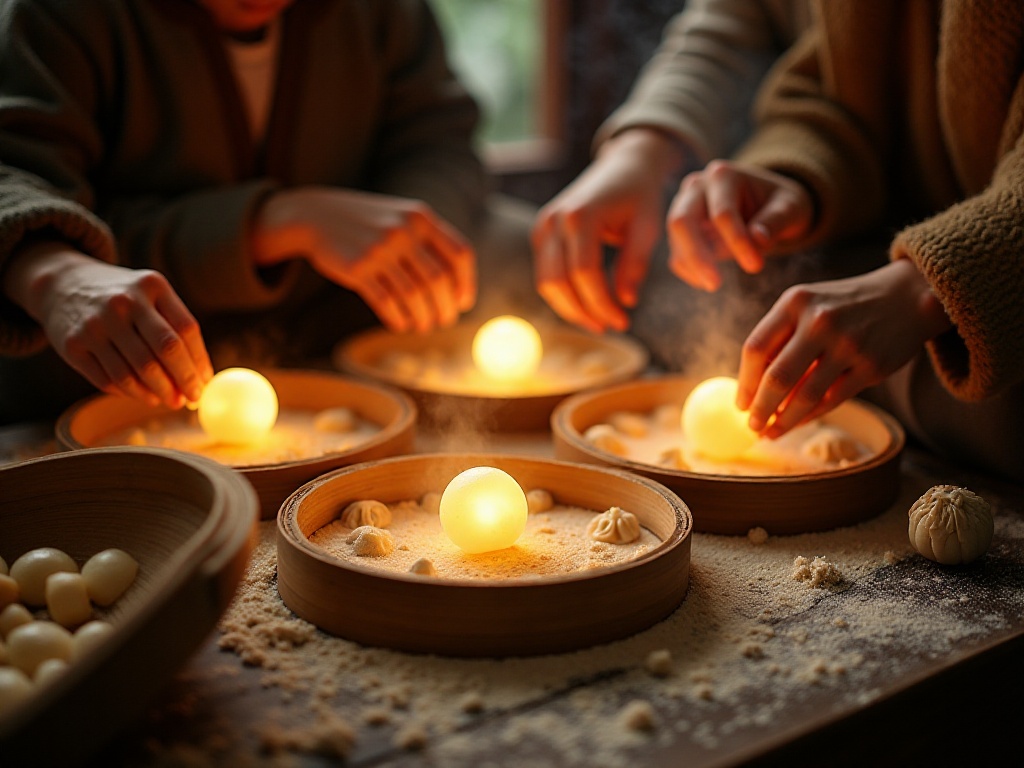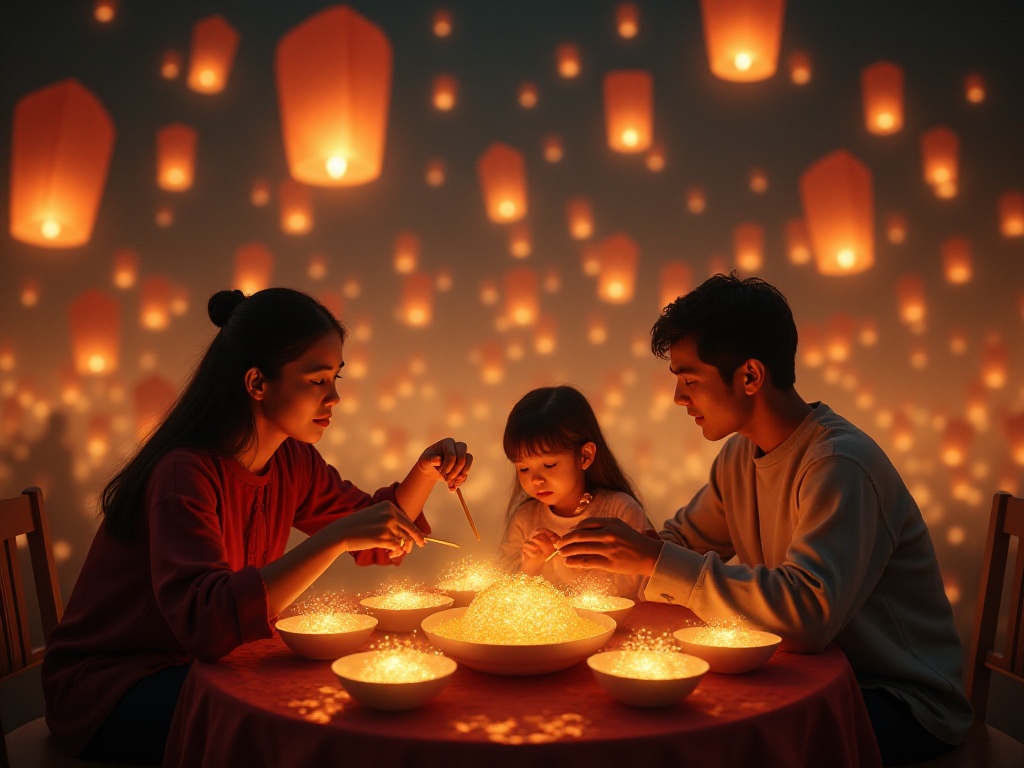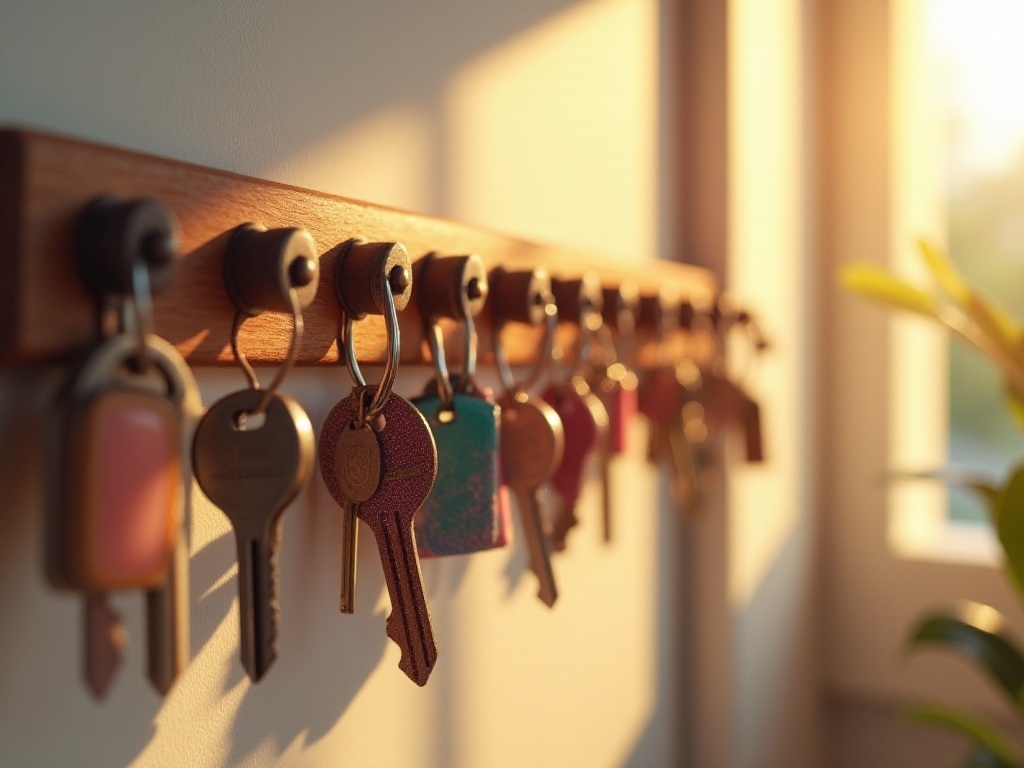Opening Thoughts
Every Lunar December, my family enters the annual "big cleaning mode." Last Sunday morning, while I was still lingering in bed, my mother stood by my bedside with a cloth and mop, giving me her characteristic "gentle look." I know this look too well - it means: "Are you sure you want to continue sleeping?"
To be honest, I used to find the year-end cleaning particularly troublesome. Whenever I saw my mother taking out cleaning tools from the storage room, I would start making various excuses to avoid it. I've used all sorts of pretexts like "I need to review my studies" or "I made plans with friends." However, as I grew older, especially after getting my own place through work, I began to understand the significance of this tradition. Now, as year-end approaches, I actively pick up the broom and cloth to start my "annual big cleanup."
Historical Origins
The big cleaning tradition has quite a prestigious background. Looking into the ancient book "Book of Rites," we can find its traces. "At year's end, when all matters are concluded, return the old tools, and clear everything empty." In modern terms, this means: at year's end, complete all tasks, put away used items, and thoroughly clean the house.
This custom can be traced back to the pre-Qin period, when people already had the habit of year-end cleaning. In ancient times, during the year-end, people would conduct a thorough cleaning. This included not only cleaning houses but also repairing windows and mending roofs. This custom has continued to this day, becoming an integral part of Chinese traditional culture.
In my research, I found that during the Han Dynasty, government offices would organize large-scale environmental cleanup activities. This included not only street cleaning but also road repairs, essentially an ancient version of "city appearance management." By the Ming and Qing dynasties, this tradition had developed into something quite sophisticated. Different regions had their own unique cleaning methods and customs, forming a rich and diverse folk culture.

Modern Significance
As someone born in the 90s, I feel the significance of Spring Festival cleaning has far exceeded mere cleanliness. It's more like a ritual, reminding us to hit the "pause button" on our lives and organize things properly.
The other day, while organizing my bookshelf, I found my high school textbooks with my drawings and notes still tucked inside. I froze at that moment. I remember being bored in class and drawing simple sketches on scratch paper, often passing notes with my deskmate. Looking at these now, I'm instantly transported back to that classroom, almost hearing the teacher's voice.
Moreover, I found photos from my university days. I had just started learning photography then, carrying my camera everywhere despite my poor skills but high enthusiasm. Looking at those poorly composed photos, I couldn't help but laugh. I was truly "fearless in my ignorance" back then, willing to photograph anything, believing I could capture it well.
What moved me most was finding my diary from my first year of work. Fresh out of college, I was full of expectations yet somewhat lost. I remember writing in my diary, often encouraging myself and listing ambitious goals. Looking back now, some goals have been achieved, while others still need more effort. Isn't this a review and organization of life itself?

Cleaning Tips
Regarding specific cleaning methods, over the years I've developed my own "battle plan." First, follow the principle of "top to bottom, inside to out." This logic is simple - you can't mop the floor before dusting the tables; everything must be done in a rational order.
I usually start with the ceiling and lighting fixtures. I remember once ignoring this order - I had just finished mopping the floor to a shine when dust from cleaning the lights fell all over it, forcing me to mop again. I was so frustrated! Since then, I've remembered to always handle things up high first. Use a long-handled duster to clean cobwebs from the ceiling and corners, then wipe the lights and upper fixtures with a cloth.
Next come the walls and windows. This requires technique. I used to use a dry cloth for wiping, which was not only laborious but ineffective. Later, I learned a trick from my mom: first vacuum the loose dust from the walls, then wipe with a slightly damp cloth. For windows, it's best to clean on an overcast day, as strong sunlight can cause glass cleaner to leave marks.
Furniture cleaning is also important. We have lots of wooden furniture, which I clean very carefully. First, vacuum the dust from the crevices, then wipe with specialized wood furniture cleaner. This not only cleans but also protects the wood. For fabric sofas, I sprinkle baking soda, wait ten minutes, then vacuum it up to remove odors.
Floor cleaning is the final step. We have wooden floors, so I first vacuum, then mop with a slightly damp mop. It's important not to use too much water as it can damage the floor. After mopping, it's good to open windows for natural drying.
Speaking of zone cleaning, it's definitely effective. My home is about 80 square meters, and trying to clean it all at once would be exhausting. So I usually divide the house into zones: living room, master bedroom, second bedroom, kitchen, and bathroom. Cleaning one zone per day prevents exhaustion and ensures quality.
I've discovered another trick: wearing Bluetooth earphones to listen to music or podcasts while cleaning. This makes the process less boring and allows for learning simultaneously. Sometimes I finish cleaning a zone while listening, giving a great sense of accomplishment.

Environmental Awareness
With growing environmental consciousness, I pay special attention to this aspect while cleaning. I used to rely on chemical cleaners, thinking they were more effective. But later I discovered that many natural cleaning products work just as well and are better for the environment and health.
For instance, white vinegar is excellent. I often use it to clean glass with great results. Mix vinegar and water in a 1:1 ratio in a spray bottle, spray on glass and wipe - it lacks the harsh smell of chemical cleaners and leaves everything sparkling.
Baking soda is another wonder product. It not only removes odors but also cleans sinks. Our stainless steel sink often gets water stains, but baking soda makes it look new instantly. Plus, it's very cheap, just a few yuan per box, with numerous uses.
By my calculations, since switching to natural cleaning products, our monthly cleaning supply expenses have decreased by at least a third. Most importantly, we no longer worry about chemical cleaner residues affecting our health.
Ritual Aspects
Speaking of Spring Festival rituals, our hometown has many traditions. After cleaning the house, we perform a "welcoming fortune" ritual. I particularly enjoy participating in this process, as it really brings out the New Year atmosphere.
After the big cleaning, my father buys Spring Festival couplets and "fu" characters. My mother prepares paper-cuts carefully. Hanging couplets requires skill - the left and right sides must be symmetrical, and the horizontal scroll must be straight. My father is always very careful, repeatedly measuring with a tape measure to avoid crooked placement.
I love putting up window decorations most. Though our windows aren't large, we always decorate them with beautiful paper-cuts. Sometimes it's auspicious "fu" characters, sometimes vivid zodiac animals. Viewing these paper-cuts in sunlight fills the entire room with New Year spirit.
Last year, I specifically learned paper-cutting. Though my results weren't very pretty, I felt quite accomplished when putting them on the windows. When my mother saw them, she even took pictures for her WeChat moments, saying, "My daughter finally understands and appreciates traditional culture."
Generational Inheritance
As someone from the 90s generation, I find our attitude toward traditional culture interesting. While we might complain about certain old customs being troublesome, we also inherit and innovate them in our own way.
For instance, a friend who loves making vlogs created a "90s Generation Spring Festival Cleaning" series last year. She filmed everything from organizing closets to cleaning windows, making it all very interesting. She incorporated modern elements like various storage solutions and special cleaning tools. The video series gained lots of attention on social media, inspiring many young people.
Another friend turned big cleaning into a "minimalism" activity. While cleaning, she carefully considers whether each item is still needed, then categorizes unnecessary items. Those that can be sold go to second-hand platforms for some extra money; suitable items are donated to charity. This approach is not only environmentally friendly but also helps those in need.
Statistics show that over 60% of post-90s and post-00s generations actively participate in family cleaning. Many share their cleaning experiences and insights on social media. This sharing not only helps more young people understand traditional culture but also stimulates innovative thinking.

Modern Implications
In this fast-paced era, the significance of Spring Festival cleaning seems to have become even more important. It's not just about cleaning the house but an opportunity to organize life and settle one's mind.
Through organizing physical space, we're actually organizing our inner world. Each item carries memories, and each cleanup is a review. During this process, we can re-examine our lifestyle, considering what we truly need and what we can let go of.
This reminds me of a book I read that said, "Organizing your external environment is also organizing your inner self." This makes a lot of sense now. When we get our rooms perfectly clean, our mood improves significantly.
Moreover, big cleaning is a great family activity. During this process, family members can cooperate and help each other. Though there might be minor disagreements over different opinions, the sense of accomplishment upon completion is shared. These shared experiences deepen family bonds.

Final Thoughts
Speaking of organization, I suddenly realized that our lives now include not just physical space but also digital space. The mountains of photos on our phones, messy computer folders, various social media accounts... Don't these also need a thorough organization?
The other day, I spent an afternoon cleaning my phone. I deleted many unused apps, organized years of accumulated photos, and categorized and backed up important files. Though the process was somewhat tedious, it felt very refreshing afterward, like giving my digital life a big cleanup.
Actually, whether it's traditional house cleaning or modern digital organization, they all help us welcome the new year in a better state. Through these actions, we not only refresh our living environment but more importantly, purify and elevate our spirits.
This might be the deepest meaning of Spring Festival cleaning. It's not just a tradition but a life wisdom, teaching us how to pause in our busy lives and properly organize both our living space and spiritual space.


